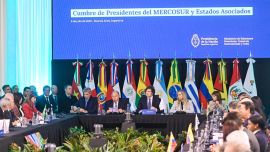One day before Argentina heads to the polls for the PASO primaries, opposition parties and the government are still quarreling about Smartmatic, the software that will be used in Sunday’s election.
After weeks of controversy, the software will end up being used in Sunday’s elections after national electoral judge María Servini de Cubría decided not to take up a request presented by Frente de Todos presidential candidate, Alberto Fernández. He sought to suspend the use of the software for the PASOs, as well as the first round and potential run-off. Instead the judge opted for the “additional measure” of designating judicial poll watchers that will control the transmission of the results.
The Frente de Todos grouping filed a complaint with the federal judiciary Tuesday claiming that the election data could be interfered with. Instead they asked that Correo Argentina handle the voting directly, as in previous elections.
“I fear that the government will try to interfere with the count,” Fernández said.
Responding to the claims, Interior Minister Rogelio Frigerio accused the opposition of creating the issue, saying the move was a result of Juntos por el Cambio’s support “growing every day.”
“Talking about fraud is a great irresponsibility,” he said, predicting that Sunday’s vote would be “totally transparent.”
IN QUESTION
The system in question is known as ‘SmartTally’ and is produced by the Venezuelan firm behind the Smartmatic voting system. It was acquired by Correo Argentino after the government put out a contract for tender with the agreement of the National Electoral Chamber (CNE) in 2017.
The provisional count system was put in place last year by decree, issued by President Mauricio Macri, as part of a bid to speed up the initial transmission of voting data.
Jorge Landau, the Peronist national deputy and representative for the Justicialist Party (PJ) who presented the request, alleged last week that the system endangered the rights of political parties.
“The new system of digitisation and transmission affects the rights of all citizens to information and to participate in a transparent election, which generates certainty about the results and, therefore, the legitimacy of the authority of the representatives that are elected,” Landau claimed.
Coverage of the issue has risen in recent weeks after Consenso Federal, the ‘third way’ grouping headed by presidential hopeful Roberto Lavagna, also expressed concerns over the security of the upcoming elections. Representative Daniel Pieres claimed recently that since the Smartmatic is used to give the initial count that the government could manipulate the numbers published in Monday’s newspapers, even if the later verification returns different numbers.
“The Smartmatic system is not finished. W hat they showed in the drill is not what they will use in the PASO. Then there is no security,” Pires charged, referring to a trial run test of the system that took place on Saturday, July 20, which was observed by members of the media, political parties and NGOs.
QUESTIONS
During the test run, questions were raised about the digitalisation of voting ballots into images and their subsequent transmission into telegrams, which are sent from polling stations to Correo Argentino, which then collects the count. Though no accredited journalist was allowed to observe this stage of the process, according to an investigation published by Perfil, Smartmatic technicians, Correo Argentino employees and government-friendly official observers were.
Videos later seen by Perfil journalists later revealed the point of contention: ballot slips are originally scanned into TIFF files, before being sent on to operators as PNG files. Politicians expressed concerns about this modification, indicating that votes could be tampered with during conversion and requesting proper observation be allowed.
The government has repeatedly dismissed concerns that the new system allows for a lack of transparency. Secretary of political and institutional matters for the Interior Ministry, Adrián Pérez said thatthe process increases transparency because now party officials can verify the counts. Andrés Ibarra, vicepresident of the Cabinet, added that the system was put in place to increase transparency compared to the previous system saying that transparency is “absolutely guaranteed” for Sunday’s PASO.
“There is no possibility, no chance that there will be a modification,” he declared.
On Wednesday, the software for the system was delivered to the National Election Chamber (CNE), who had ordered that it also be provided to political parties ahead of the PASOs. They also said that if the government did not provide the software they would give it to the parties themselves, after complaints about delays.
Government officials have repeatedly written off complaints about the system as “irresponsible” and asused Frente de Todos of trying to sow doubts in the election for political reasons.
“The presentation only has political ends and no grasp of technical issues,” Pérez said.
Though the controversy has not changed the fact that Smartmatic will be used on Sunday, the National Electoral Directorate (DINE) said that they will allow each part to have an assessor present at the Centro de Transmisión Electoral (CTE), in a bid to resolve objections.


























Comments